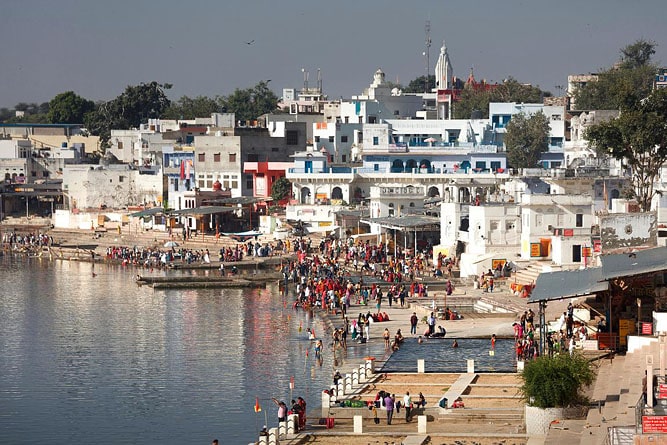Pushkar
Hindu holy city, 150 km from Jaipur
should-see attraction
Visit duration: People typically spend 1 day here
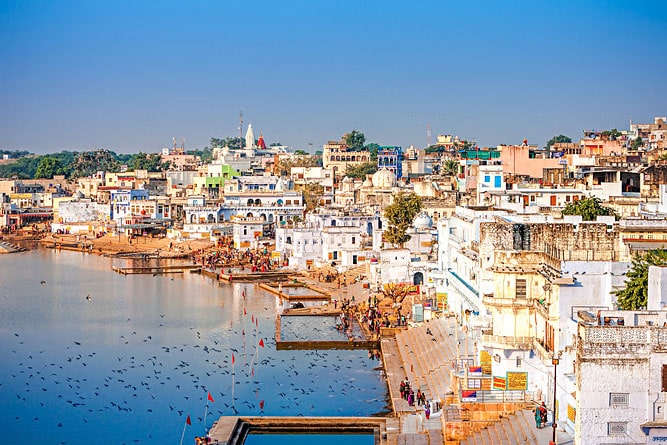
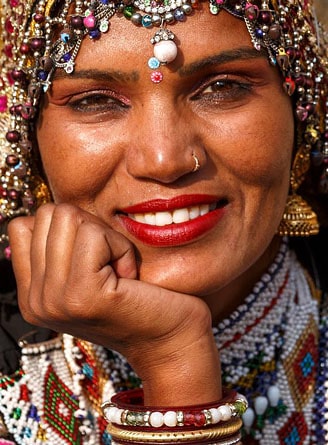
About Pushkar Holy City
Pushkar is a pilgrimage city located 150 km southwest of Jaipur. It is a holy city for both Hindus and Sikhs. It houses a Brahma temple that is considered holy by Hindus and the Gurdwaras (Sikh temples) of Guru Nanak and Guru Gobind Singh.
The city coils around Pushkar Lake which has 52 bathing ghats and 400 milky-blue temples. The hymns and chanting of prayers, the melody of the devotional songs, and the rhythmic beats of drums and gongs pervade every corner of the city.
According to a legend, a lotus flower slipped from Hindu God of Creation, Brahma's hand which gave rise to this city. Inscriptions allude that the city is as old as the Hindu religion itself while ancient artefacts mention the city to be a millennium year old.
The temples in the city are close to 200 years old. Some temples that were built in ancient India have been renovated in the 18th century.
Pushkar Lake and Ghats
Pushkar Lake, also known as Pushkar Sarovar, is considered to be a holy lake.
Surveys on the lake like Greek and Kushan coins, and inscriptions at Sanchi suggest that Pushkar Lake's origin goes back to the 2nd century BC. Chinese traveller Fa Xian while travelling to India in the 5th century chronicles Pushkar Lake. The 12th-century dam of the Luni River transformed the lake into an artificial one. After the decline of the Mughal empire, the Rajput rulers restored the celestial importance of the lake.
Ghats or the stone steps to descend to the lake are used by the Hindus to pay respect to their ancestors. Ten ghats on the boundary of the lake namely Varaha Ghat, Gwalior Ghat, Saptarishi Ghat, Kota Ghat, Gau Ghat, Dadhich Ghat, Jaipur Ghat, Karni Ghat, Gangaur Ghat and Yag Ghat have also been proclaimed ‘Monuments of National Importance’. The ghats along with the lake have been managed by the royal Rajasthani families and the Maratha kings.
The ghats are named after the royal patrons who built them excluding three ghats. The Varaha Ghat is named after Lord Vishnu who visited the ghat as an incarnation of a boar. Lord Brahma took a bath at the Brahma Ghat and the ashes of Mahatma Gandhi were immersed at the Gau Ghat therefore they were named respectively.
Guru Gobind Singh, the 10th Sikh Guru enchanted the sacred text Guru Granth Sahib at the bank of Pushkar Lake.
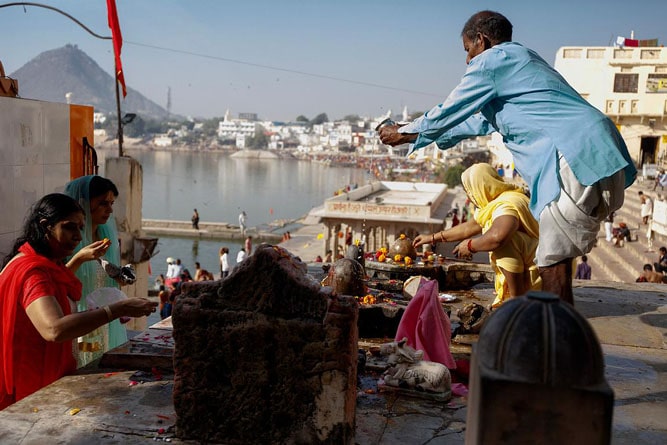
Brahma Temple
The temple, also known as Jagatpita Brahma Mandir, is a 14th-century temple dedicated to a Hindu God, Brahma. The temple is made of marble and stone slabs with a distinguishable red shikhara and a hamsa bird motif. The sanctum sanctorum depicts the four-headed Brahma and his consort Gayatri, goddess of Vedas. The temple is headed by the priesthood.
The oral history of the temple states that it was an outcome of a curse by Brahma’s consort, Saraswati or also a sage Vishwamitra built it after Brahma's Yojna (ritual) which was later renovated in the 8th century by the Hindu philosopher Adi Shankara. Further remodifications were made by Maharaja Jawat Raj of Ratlam, who attempted to restore the original architecture of the temple.
On Kartik Poornima, numerous pilgrims take a bath in the lake and step into the temple to worship God Brahma. An article in the International Business Times mentions the Brahma temple is among the top five sacred pilgrimages for Hindus in the world.
Savitri Temple
Savitri Mata Mandir or Savitri Temple is a hilltop Hindu temple of Goddess Savitri settled on the Ratnagiri hill at an elevation of 750 feet which comprises 970 steps that oversee the Pushkar Lake. The temple houses the wives of Lord Brahma, Goddess Savitri, Goddess Sharda and Goddess Gayatri. According to the Hindu calendar on the Saptami Night of the Bhadra month, Jagran is organised.
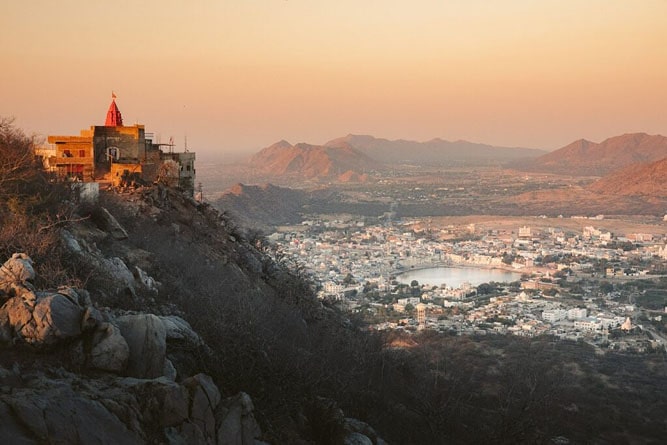
Pushkar Camel Fair
The Pushkar fair is an annual cultural festival, regionally known as the Kartika Mela. The livestock fair is also known as the Camel Fair though it also includes horses and cattle. It is also a pilgrimage season to visit Pushkar Lake. This five-day-long festivity is a Hindu-Sikh-Jain cultural festival. The fair is organised on Pushkar Lake’s banks. The festival is widely popular as it attracts over a million visitors every year.
The festival gained its fame for the various colourful events and the wide range of handicrafts on textile items available at the fair. There is song, and music along with the well-known ‘Matka Phod’ event.
Such festivals speak a lot more about the people and the tradition than any article can ever describe.
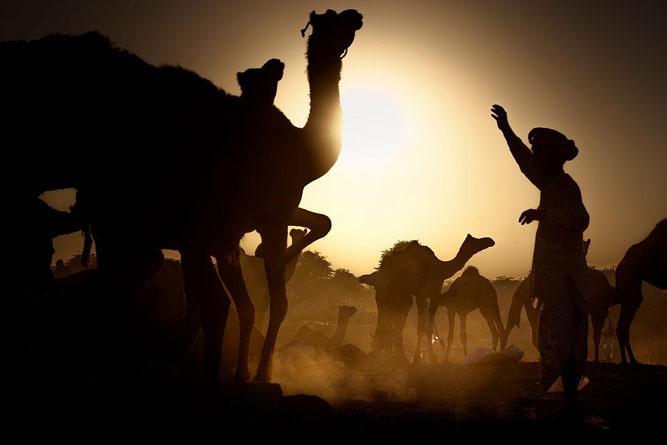
Other sights in Pushkar
A Sikh Gurdwara in Pushkar is a sacred pilgrimage site for Sikhs. The Guru Nanak Gurdwara in the eastern part of the town is called Guru Nanak Dharamsala, while the second Sikh temple is dedicated to Guru Gobind Singh who visited Pushkar after leaving Anandpur Sahib.
It has a memorial shrine built with the sponsorship of the Maratha Empire, after the Hindu-Muslim wars during the collapse of the Mughal Empire.
A Pushkar Brahmin priest, a descendant of the priest who met the Guru, retains a copy of an old handwritten Sikh scripture, the Guru Granth Sahib and a Hukumnama acknowledged by Sikhs to have been authored by Guru Gobind Singh.
Facts and tips about Pushkar
- While visiting Pushkar Lake, it is a rule to take off your shoes while descending the ghats.
- A red thread or the Puskar Passport tied on the wrist of pilgrims denotes that the visitors have been to the lake and other priests, therefore, do not approach for further rites and fees.
- According to folklore, Nahar Rao Parihar of Mandore, a ninth-century Rajput king, was chasing a white boar on a hunting expedition. He chased it to the lake, he dipped his hand into the lake to quench his thirst, and to his astonishment, he noticed the leukoderma marks had disappeared from his hands. He wanted to share the sacred curative nature of the lake, therefore he restored the lake.
Sleeping in Pushkar
The accommodation services provided by the city are on a reasonable budget. However, the prices increase during festive times like the Pushkar Camel Fair and it is better to book rooms several weeks ahead.
Hotel Keshav Palace
Hotel Keshav Palace located in Choti Basti is very well maintained, clean and peaceful to lodge during a trip to Pushkar. The ghats and the central towns along with the markets and restaurants are just within 10 minutes. The rooms come with comfortable beds, secured windows and a terrace with seats and tables to relax leisurely. They provide the option of choosing an air-conditioned room. The lodging provides rooms at affordable rates.
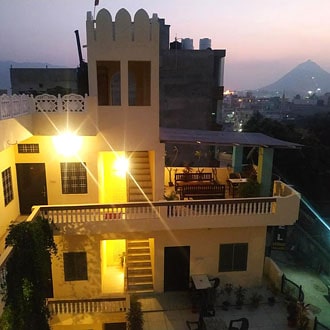
Pushkar Retreat Resort
The hotel is a 15-minute walk away from Pushkar Lake. Aside from comfortable rooms, the entire premise is wheelchair friendly. It has a garden and a terrace and a fitness centre to burn off the calories. The services are offered at a reasonable rate.
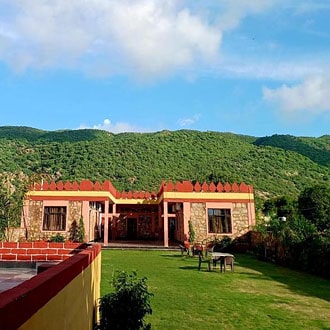
Hotel Rising Star
The hotel is located 500 m away from Pushkar Lake. The relaxing atmosphere along with warm and gracious hospitality. The in-house restaurant at Hotel Rising Star offers breakfast, lunch and dinner from October to April.
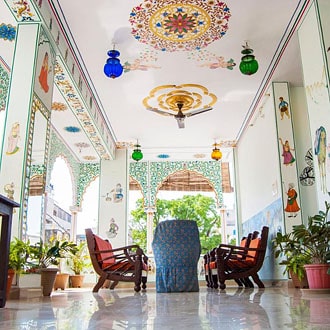
Inn Seventh Heaven Hotel
The budget-friendly hotel is located at Choti Basti. Enter the Inn Seventh Heaven through wooden doors into a courtyard ornamented with a marble fountain in the middle and encompassed by tumbling vines while the rooftop is decorated with swing chairs and sofas for the travellers to relax. The rooms vary in size from budget rooms to spacious Asana Suite. The hotel has a restaurant settled on the roof. Inn Seventh Heaven recommends booking rooms beforehand.
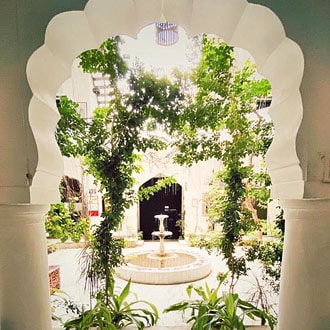
Hotel Gulaab Niwaas Palace
This expensive hotel is a 5-minute walk away from the centre of town. Gulaab Niwaas Palace is built on sand dunes surrounded by hills providing a splendid view of Pushkar Lake. The facilities offer a desert rose cafe, a sun terrace and an in-house restaurant. The rooms vary from standard to deluxe to suites with private balconies and abundant natural light.
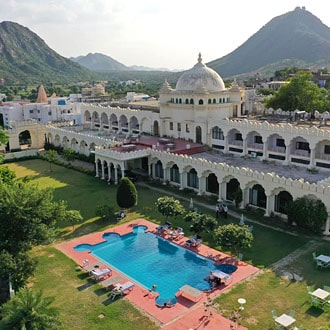
Eating in Pushkar
The holy city serves delectable vegetarian dishes of diverse cuisine. The city consists of plenty of eateries that fit perfectly with the divine sight of the lake. The consumption of egg, fish or meat is prohibited here.
Shri Venkatesh Restaurant
Shri Venkatesh Restaurant is located near Choti Basti. It opens at 9:00 am and closes at 10:00 pm. Dive into the local north Indian cuisine of dhal, khofta, paneer served with freshly cooked chapatis and traditional chai. The thalis can be devoured at a very pocket-friendly price. Watch the food being prepared in front of you or enjoy the street view from the upstairs floors.
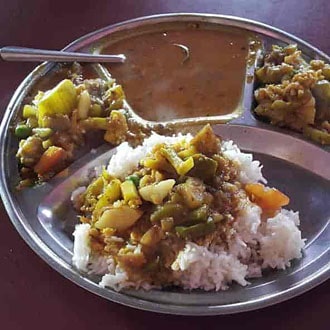
Falafel Wrap Stalls
This small roadside food stall located at Sadar Bazaar provides services from 7:30 am to 10:30 pm. Enjoy the experience of eating while sitting on a stool or munching on the food as you walk around the city. The food stall is well-known among Israeli travellers for its preference for filling falafel-and-hummus wraps. Such delicious meals are available at the cheapest expense.
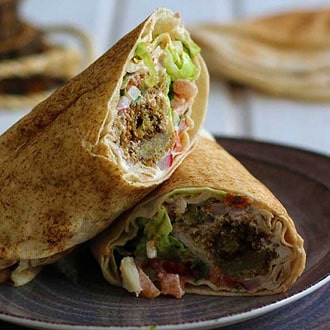
Om Shiva Garden Restaurant
The restaurant located near Naya Rangji Temple is open from 8:00 am to 11:00 pm. The cuisine includes Italian, German, Mexican, Chinese and North Indian with featured dishes of wood-fired pizzas and espresso coffee. The restaurant provides pocket-friendly dishes that never cease to satisfy the travellers.
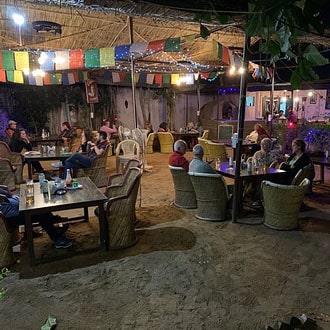
Honey & Spice Restaurant
The family-friendly wholesome restaurant is located at Laxmi Market near Sardar Bazaar. The restaurant offers only breakfast and lunch from 8:00 am to 5:30 pm. The cuisine specialises in Indian food that consists of brown rice, and stew combined with vegetables and salads. They serve delicious homemade pastries and South Indian coffees. The dishes can be enjoyed at a pocket-friendly expense.
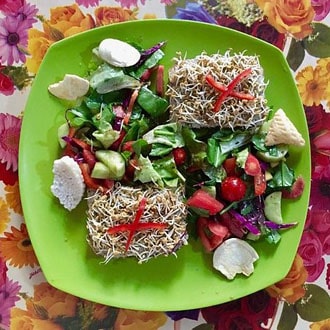
Sunset Cafe
The cafe is located near the Jaipur Ghat and offers a sublime view of Pushkar Lake. The Sunset Cafe is open from 7:30 am till midnight and offers the standard tourist menu that includes pizza, curries, pasta, and a German bakery at affordable prices. The lakeside cafe is known for getting crowded during the sunset and offers its cuisine on a pocket-friendly budget.
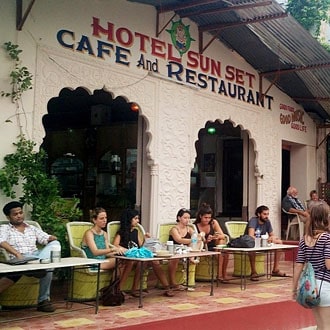
How to reach Pushkar
Pushkar is centrally located between Jaipur (3-hour drive), Jodhpur (4.5-hour drive) and Bundi (4-hour drive). Pushkar is the perfect location for a pleasant overnight halt when travelling between Jodhpur and Jaipur. Pushkar can also be reached from Udaipur in 5.5 hours by car.
See location on Google Maps
Other cities near Pushkar
- Ajmer - 13 km
- Jaipur - 150 km
- Bundi - 183 km
- Jodhpur - 187 km
- Udaipur - 300 km
FAQs about Pushkar
1. When is the Pushkar ka Mela or the Pushkar Camel Fair celebrated?
According to the Gregorian calendar, it is celebrated between late October and early November every year.
2. Are there any restrictions to keep in mind while visiting Pushkar Lake?
Smoking is prohibited at the lake, along with taking photographs without permission.
3. How to reach Savitri Temple in Pushkar?
Savitri temple can be ascended by hour-long hiking or by ropeway.
